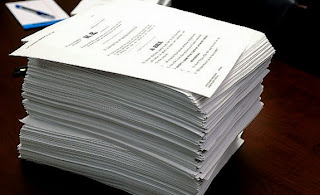I can't begin to count the times I've heard the Left's argument that some institution in our society went awry primarily due to a lack of regulations. Well, this Democrat administration has certainly been no stranger to new regulations. On the contrary, the Obama regime has proven to be the harbingers of overregulation. Let's start out singularly, then expand further...
Words mean things, right? Leave it up to Big Government to complicate that. Take for instance the definition of 'full-time employment'...per Obamacare, that is!
WashingtonExaminer: One of the most-anticipated new federal regulations governing which companies will be required to provide health insurance under Obamacare has finally landed--with a thud.
In the latest indication of how complicated putting the Affordable Care Act into action will be, the Department of Health and Human Services and Internal Revenue Service issued 18-pages of regulations just to describe what a "full-time employee" is. Of note, to the Feds a full-time employee works an average of just 30 hours a week, not the normally accepted 40 hours.
The IRS rule is key because companies with more than 50 full-time employees must provide health insurance under Obamacare, or be fined. Business groups have been warning that small companies might try to replace full-time workers with part-time help to avoid being forced to offer health insurance in 2014, but the 30-hour full-time definition is likely to undermine those plans.
Ya think? So, in order for a small business that might not be in a position to offer a government approved health insurance plan and simultaneously stay afloat, they'll either have to scale back even more with less employees at fewer hours, or attempt to comply with the new regulations despite the detriments imposed on their business overhead and profit margins. At that point, if you can't profit, one has to ask what's the purpose of having a business and striving for success? If you're not among Big Government's chosen, then it's at this juncture that more and more small business owner are coming to the realization that this administration views them as just another subject of what the state dictates is 'enough' for a meager living...forget about success.
The lengthy 18-page definition caught some in the business world by surprise. "It's scary," said Randy Johnson, the U.S. Chamber of Commerce senior vice president for labor, immigration, and employee benefits. "It's just a small example of two words under our healthcare law of 2,700-pages," he said, adding: "It says to me things are awfully complicated."
Johnson noted the new Obamacare ruling to demonstrate how oppressive federal regulations have become on American business. At a press conference to discuss the costs of regulations and state of the economy, Johnson said that Obama has added 11,327 new pages of federal rules and regulations.
11,327 new pages of federal rules and regulations?! There's where we expand...literally!
CNSNews: Over the past three years, the bound edition of the Code of Federal Regulations has increased by 11,327 pages – a 7.4 percent increase from Jan. 1, 2009 to Dec. 31, 2011. In 2009, the increase in the number of pages was the most over the last decade – 3.4 percent or 5,359 pages.
Over the past decade, the federal government has issued almost 38,000 new final rules, according to the draft of the 2011 annual report to Congress on federal regulations by the Office of Management and Budget. That brought the total at the end of 2011 to 169,301 pages.
That is more than double the number of pages needed to publish the regulations back in 1975 when the bound edition consisted of 71,244 pages.
Mr. Johnson reappears in this article as well...
Randy Johnson, senior vice president of labor, immigration and employee benefits at the U.S. Chamber of Commerce, distributed a handout of a Congressional Research Service analysis of a 2008 study commissioned by the Small Business Administration that estimated the annual compliance price for all federal regulations at $1.7 trillion that year.
Seventy percent of the regulations were economic, accounting for $1.236 trillion of the annual cost. The other regulations were, in order of cost, environment regulations ($281 billion), tax compliance ($160 billion) and occupational safety and health and homeland security ($75 billion).
“I think these kinds of figures, if you put yourself in the place of a business person you’ll find them fairly mindboggling,” Johnson said.
So we attempt to pay off the national deficits that politicians and government bureaucrats have run up on the backs of small business owners, instead of ending Washington's wasteful spending (which ironically lies in much of this burdensome regulation)? This insight should truly add to the counterfeit claim of only 'taxing the rich'. This administration will take everyone's money (for better, for worse, for richer, for poorer, in sickness and in health...not so much to love and to cherish, but absolutely till death do us part) through the backdoor of incessant regulation.
With both of these articles combined, does the concept of crony capitalism depressing businesses come to mind? Or for that matter, a little book called Atlas Shrugged, where the makers become so disgusted with the takers that they leave? But we won't ever have to worry about that, because there's no war on business in America, right? When success is turned into a dirty word, and an industrious people can't make a move without being burdened by an unrestrained State, you bet there is.


